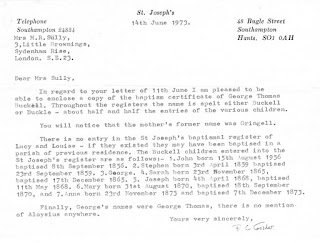
Hilary Gadsby
QuickLesson 3: Flawed Records
Elizabeth Shown Mills, “QuickLesson 3: Flawed Records,” Evidence Explained: Historical Analysis, Citation & Source Usage (https://www.evidenceexplained.com/content/quicklesson-3-flawed-records : accessed 27 March 2016)
Elizabeth Shown Mills, “QuickLesson 3: Flawed Records,” Evidence Explained: Historical Analysis, Citation & Source Usage (https://www.evidenceexplained.com/content/quicklesson-3-flawed-records : accessed 27 March 2016)
For this lesson I want to look at 2 items that have been digitized pertaining to the birth of my great grandfather.
The first item refers to baptisms for children at St Josephs Church in Southampton and the second is a copy birth certificate for one of the children mentioned in the letter.
Apart from the fact that neither of these are original records there is a difference of dates. Had I not had a copy of the letter I would not have been aware of the possibility that the date of birth could be anything other than that recorded on the official birth certificate.
Thorough research including records made independent of each other can lead us to question even the records we would consider to be accurate.
When I looked at these I had to consider why would the birth certificate have the baptism date recorded as the date of birth. Had his mother got confused with the dates and given the baptism date. The date the birth was registered was more than 2 months after the date in the letter and almost a month after the baptism.
This birth was registered prior to 1875, at which time the Births and Deaths Act 1874 imposed a duty upon those present at a birth to report it to the registrar, so his parents were only legally obliged to inform a registrar if it was demanded by the registrar (1). Many were not aware of the law or thought that a baptism was an alternative to registration. This situation may be what happened with another ancestor whose birth appears to have taken place in 1845. I have found a baptism, but unless she was registered under an alternative name, I can find no trace in the index for the district.
If the birth had taken place after 1875 then the parents would have been fined for a registration later than 42 days after the birth (1).
I will need to search the newspapers of the time to see if this stipulation could have been common knowledge as early as 1868.
I have looked for school records to try and confirm the date of birth. I have not found any for him yet. Given that the baptism date and the date of birth on the certificate are the same it may just be a case of mistake.
I have looked for school records to try and confirm the date of birth. I have not found any for him yet. Given that the baptism date and the date of birth on the certificate are the same it may just be a case of mistake.
The earlier date is my "current thinking" and is a reasonable choice unless I find something to contradict this. I have other records which would indicate a year of birth such as census, marriage and death certificates, but these do not state an exact date, and would be considered to have been recorded at later dates than the 2 documents I have discussed.
He died in 1940 so the 1939 Register recently released on Find My Past, could be a source of information, this has recorded full dates of birth for individuals. However having found him he is listed as incapacitated. Given his cause of death he would not have been a reliable witness for the date of birth he had been using, all that it lists is an age and year of birth.
Employment records may be another source for the date of birth. He worked for a shipping company who may have records. The Clyde Shipping company has become Clyde Maritime and I found a genealogy section on their forum.
This discussion and reading the QuickLesson has led me to create this graphic
He died in 1940 so the 1939 Register recently released on Find My Past, could be a source of information, this has recorded full dates of birth for individuals. However having found him he is listed as incapacitated. Given his cause of death he would not have been a reliable witness for the date of birth he had been using, all that it lists is an age and year of birth.
Employment records may be another source for the date of birth. He worked for a shipping company who may have records. The Clyde Shipping company has become Clyde Maritime and I found a genealogy section on their forum.
This discussion and reading the QuickLesson has led me to create this graphic
If we are going to carry out thorough research and analysis of that research we must first understand the context in which a record was created and any peculiarities which may affect how we perceive what we find. This requires a knowledge which we may not have unless we educate ourselves.
We all learn in different ways and watching and participating in this type of study group is a great way to share and highlight possible problems or ways of tackling problems.
Brickwalls can fall when we know our weaknesses and where we may have missed something. Collaboration and friendly discussion can help us all become better at what we love doing.
(1) Herber, Mark D. Ancestral trails : the complete guide to British genealogy and family history. Stroud: Sutton, 2004. p55



No comments:
Post a Comment